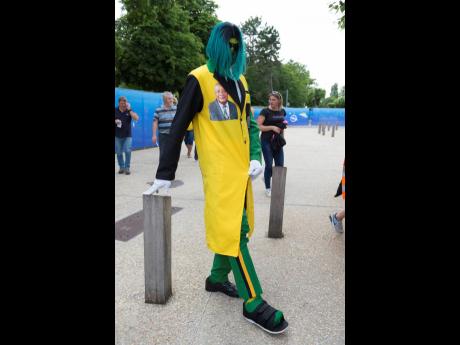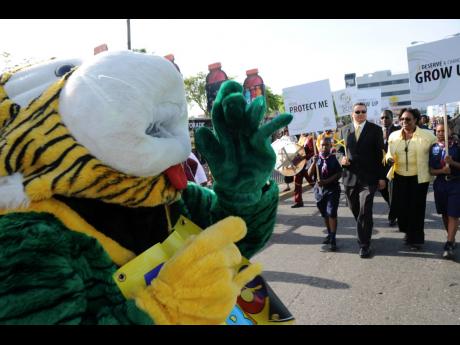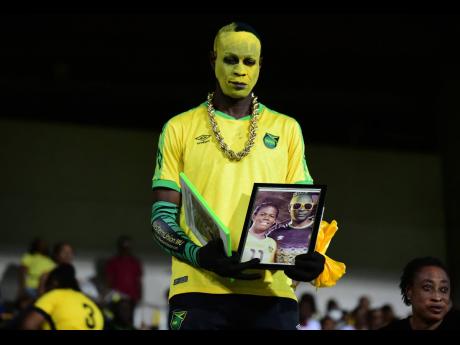Wally Walters – A Reggae Tiger’s journey
WALLY WALTERS was quietly nervous about the reception he would receive as he got dressed for Jamaica’s 1996 World Cup qualifying football match against regional counterparts St Vincent and the Grenadines. The 35,000-seat National Stadium was sold...
WALLY WALTERS was quietly nervous about the reception he would receive as he got dressed for Jamaica’s 1996 World Cup qualifying football match against regional counterparts St Vincent and the Grenadines.
The 35,000-seat National Stadium was sold out and Walters was wearing a dress and a wig, both adorned with Jamaica’s national colours.
It was clothing he would normally wear as the popular mascot for his neighbourhood team, Olympic Gardens Football Club, when they played in the Major League, the country’s second-tier domestic league at the time.
But now he was elevating his act to the national stage as the Reggae Boyz – the moniker for Jamaica’s senior men’s team – continued their historic march towards qualification for the 1998 Global football showpiece, the World Cup.
The World Cup qualification games lacked “entertainment” and he wanted to fill that void, Walters explained.
“Honestly, mi ago tell you the truth, you know when a man in a Jamaica wear frock and wig people ago think all kinda different things,” he said during an interview with The Sunday Gleaner.
“So, mi did really have a kind a doubt,” he admitted.
But Walters was undaunted as he headed to the National Stadium in his costume which, according to him, was financed by Reggae Boyz standout and fan favourite Ian ‘Pepe’ Goodison.
By a stroke of luck, the outfit caught the attention of Jamaica’s technical director at the time, Brazilian Professor Rene Simoes, as the bus carrying the Jamaican players entered the stadium, located in St Andrew, he recounted.
The dress had pictures of Simoes, Goodison and late football administrator Captain Horace Burrell, Walters said.
He was invited on to the team bus by the iconic Jamaican head coach and within minutes, Walters was standing on the playing surface taking pictures with Simoes in front of thousands of wildly cheering spectators.
That chance encounter on November 10, 1996 – almost 27 years ago – marked the birth of Reggae Tiger, the popular mascot that became a fixture at Reggae Boyz games locally and overseas.
It was also a life-changing moment for the then 30-year-old, who saw his mother struggle through economic hardships and political violence to raise four children in their tough inner-city community of Olympic Gardens.
“I heard the crowd making a lot of noise and I was like ‘wow, this is awesome’. I felt 100 per cent good when I heard the response and mi just start dance,” Walters recalled of the reaction to his outfit.
His popularity increased and soon doors started to open up for him.
SPONSOR
A local company signed on as his personal sponsor and helped to create the “tiger suit” that replaced the dress and wig.
And in February 1998, Walters boarded a plane for the first time. He was part of the Jamaican contingent that jetted off to Orange Bowl Stadium, in Florida, for a Gold Cup clash between Jamaica and the United States.
The US visa was secured through assistance from Simoes and Burrell.
“They told me to come in [to the JFF office] for a letter to take to the US Embassy. I collected the letter, went to the embassy and then mi get mi first visa,” he recounted.
“It was a one entry and it was stamped ‘to accompany Jamaica’s football team as a mascot’.”
Another one-entry visa to accompany the team for a game in the state of New Jersey preceded his selection to a 23-member delegation that travelled with the Reggae Boyz to France for their 1998 World Cup debut.
Since then, he has travelled throughout Europe, including a family vacation and a 2019 return to France when Jamaica’s senior women’s team, like their male counterpart, earned an historic berth to the finals of the Women’s World Cup.
“I travelled with them with a broken foot.”
For Walters, it was a long way from his Olympic Gardens community where, as a child, he had a close brush with death during the political upheavals of the late 1970s. He and other family members were inside their yard when armed thugs staged a surprise attack.
“A man come over di fence wid a gun and then me hear ‘click, click’ and as me mother grab me up and run in a di house we just hear ‘bow, bow’,” he said, mimicking how the gun misfired before eventually discharging two bullets.
“Things were rough for us. My father run way from a tender age so mi never get da fatherly love deh,” said Walters, himself a father of four.
He was recently honoured by 3T Muzic Record Radio, a Jamaican-owned station in Belgium, for “outstanding achievement” as the official Reggae Boyz mascot for 26 years. It is something he is proud of, especially since his tenure has gone unnoticed by Jamaica’s football administrators.
“Twenty-six years for your country and nobody gives you an award, not even a bottle of water or even to say ‘well, we acknowledge this’,” he said.
Dennis Chung, general secretary of the Jamaica Football Federation, said he was not aware of any official engagement with Walters.
“I don’t think that we have an official position called team mascot,” Chung told The Sunday Gleaner.
However, he acknowledged that Walters has given “good service” and that the JFF could consider some form of recognition.
“Now that you have raised it, it’s something that should be considered because he really has given dedicated service to the teams.”



